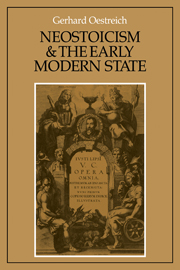Book contents
- Frontmatter
- Contents
- Foreword
- Introduction
- PART I JUSTUS LIPSIUS AND THE NETHERLANDS MOVEMENT
- 1 Constantia in publicis malis
- 2 The political intent in Neostoic philosophy
- 3 The main political work of Lipsius
- 4 Political Neostoicism
- 5 The military renascence
- 6 The European echo
- 7 The Netherlands movement in Brandenburg-Prussia
- PART II THE CONSTITUTIONAL DEVELOPMENT OF THE EARLY MODERN STATE
- Index
7 - The Netherlands movement in Brandenburg-Prussia
Published online by Cambridge University Press: 04 May 2010
- Frontmatter
- Contents
- Foreword
- Introduction
- PART I JUSTUS LIPSIUS AND THE NETHERLANDS MOVEMENT
- 1 Constantia in publicis malis
- 2 The political intent in Neostoic philosophy
- 3 The main political work of Lipsius
- 4 Political Neostoicism
- 5 The military renascence
- 6 The European echo
- 7 The Netherlands movement in Brandenburg-Prussia
- PART II THE CONSTITUTIONAL DEVELOPMENT OF THE EARLY MODERN STATE
- Index
Summary
During our examination of the first phase of the Netherlands Movement, one thing has so far become clear: in various parts of Europe and in different political and religious camps, such men as Henry IV and Oldenbarneveldt, Richelieu and Gustavus Adolphus, the princes of Orange-Nassau and Maximilian of Bavaria were linked by their adherence to Stoic ideas and ideals. Even if they came into conflict with one another, they can be seen as constituting a group of statesmen agreed on certain modes of political thought and action. They were united by principles which combined prudentia (ratio) and virtus, civil and military institutions, political discipline and asceticism. A generation later these men were joined by the Elector Frederick William of Brandenburg and his collaborators, for the Netherlands Movement exercised a decisive influence on the spirit and evolution of the Prussian state for more than a century. Holland, at the high point in its history, was the educational centre of Europe. From Germany alone nineteen thousand students attended the Dutch universities and consequently not only enriched German cultural life, but also benefited the Prussian state and its economy by the knowledge they had acquired abroad. At first is seems surprising that even the military state of Prussia should have been influenced by the bourgeois and far from military republic of the Netherlands. However, the bourgeois image of the republic is not appropriate to its history during the eighty years of war, nor is the one-sided picture of Prussia as a land without culture entirely just.
- Type
- Chapter
- Information
- Neostoicism and the Early Modern State , pp. 118 - 132Publisher: Cambridge University PressPrint publication year: 1982



